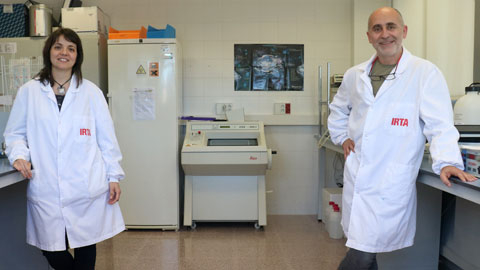Award to project on the potential role of pets in SARS-CoV-2 transmission

The project directed by Joaquim Segalés is one of the four from the category in Ecology and Veterinary Medicine selected by the BBVA Foundation's for its call for research into coronavirus.
05/10/2020
At the end of May 2020, the BBVA Foundation announced a call for grants with the aim of fostering coronavirus research projects. The call included an Ecology and Veterinary Medicine category, with a sum of 400,000 euros going available to four different projects. A total of twenty projects were selected among all the categories, which means that over 400 researchers through different angles will study the virus' mechanisms of infections, diagnostics and treatment, and psychosocial and economic effects.
Among the winning projects is a proposal to study the role of pets in virus transmission. The project is directed by veterinarian Joaquim Segalés, professor of the Faculty of Veterinary Medicine at the Universitat Autonòma de Barcelona (UAB) and researcher at the Centre for Animal Health Research (CReSA) of the Institute for Agrifood Research and Technology (IRTA), alongside Júlia Vergara-Alert, virologist specialising in animal disorders at the IRTA-CReSA.
The two researchers for part of the animal models group of the World Health Organisation, and recently published a study on the first coronavirus case detected in a pet in Spain, a cat named Negret.
In the project description, shared by the BBVA Foundation, the authors pointed to SARS-CoV-2 being considered a “zoonotic pathogen agent”, despite it being “basically transmitted among humans". “Nevertheless, there are different descriptions that indicate that pets can be exposed to the virus. Through experimental infections in cats, hamsters and ferrets, it was possible to demonstrate that the virus can also be transmitted among animals”, the researchers pointed out.
The project was launched by an IRTA-CReSA team that has been researching coronavirus in animals since 2014, with the objective of establishing SARS-CoV-2's frequency of infection among pets and determine their potential role in the epidemiology of Covid-19.
Animal models
The other winning projects in the veterinary medicine category are related to trasgenic mice models for the study of the infection in both humans and animals, and is directed by Alfonso Gutiérrez Adán, research lecturer and co-director of the Department of Animal Reproduction at the National Institute for Agrarian and Food Research and Technology (INIA). Participating in the project is INIA's ZOOVIR group formed by veterinarians. The project aims to generate transgenic mice models capable of reproducing human infections and models of species capable of transmitting SARS-Cov-2, selected for their ACE-2 protein, which acts as an entrance for the virus, very similar as to what occurs in humans.
The description of the research was presented by the BBVA Foundation and explains that mice have a version of the ACE-2 protein which contains differences to the protein found in humans, and which hinders the virus from entering the bodies of mice, therefore preventing becoming infected with SARS-CoV-2. Therefore, to model and study Covid-19 in mice, it is necessary to express the human ACE-2 receptor, or that of the species needing to be studied.
These transgenic mice will serve to analyse ineffectiveness, vulnerable species, species that transmit SARS-Cov-2 and/or new coronaviruses which may appear in future pandemics. They will also be unique models for the study of new Covid-19 drugs and fight possible new outbreaks of this or other coronaviruses.
The other two selected projects belong to the category ecology and will study the detection of SARS-CoV-2 in atmospheric aerosol and its relation with atmospheric pollution and Covid-19. The call's evaluating committee was presided by Pedro Jordano, research lecturer at the Integrative Ecology Group of the Doñana Biological Station-CSIC; and included the following members: Miguel B. Araújo, research lecture at the National Museum of Natural Sciences-CSIC; José de la Font, lecturer in Research, Health and Biotechnology at the Institute for Research into Hunting Resources (CSIC-UCLM-*JCCM); Christian Gortázar, professor in Animal Health at the University of Castilla - La Mancha; Carlos Montes, professor in Ecology at the Universidad Autónoma de Madrid; and Elías Rodríguez Ferri, professor in Animal Health (Microbiology and Immunology) at the University of Leon.
This information is related to the following SDG
Life on land
Good health and well-being
Partnerships for the goals